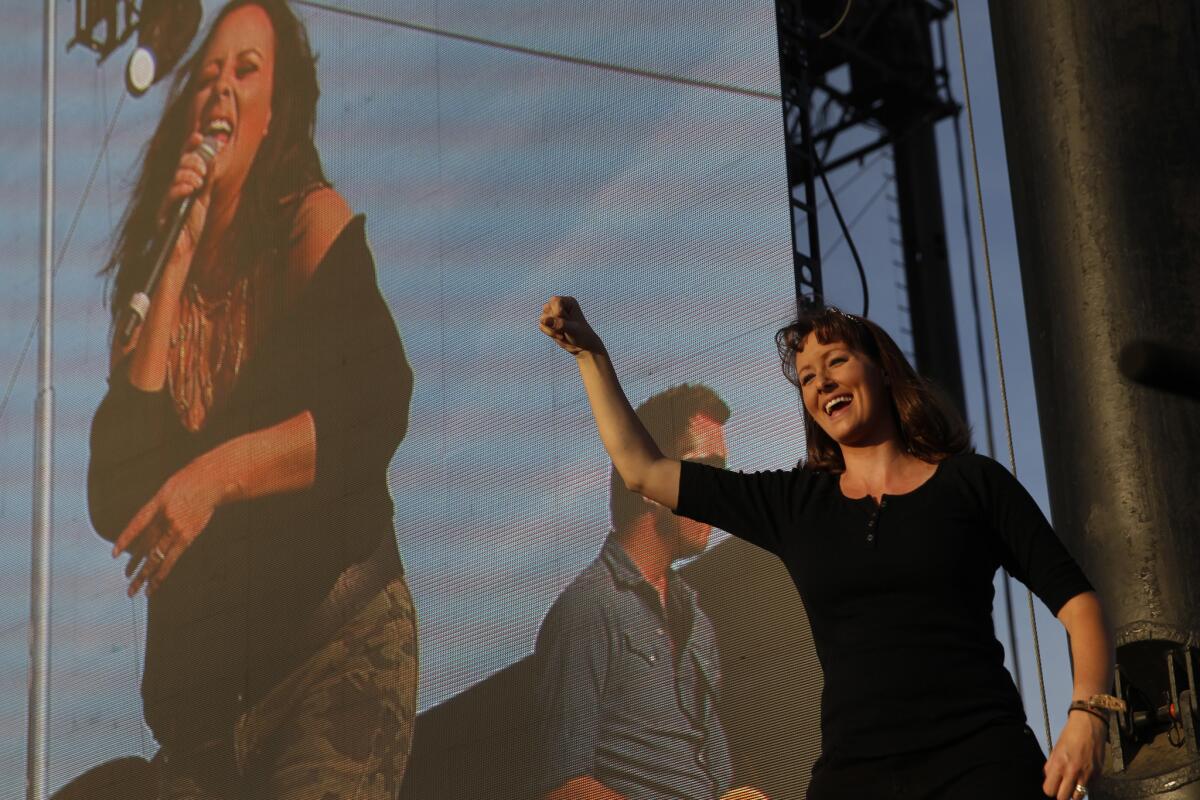Stagecoach 2015: Deaf music fans want to have fun too

Should all the fun of experiencing live concerts and music festivals such as Stagecoach and Coachella be reserved only for fans who can hear?
Tracy Halmgean says no, and that’s when she goes to work. For the last seven years she’s been coordinating sign language interpreters for both festivals under contract with festival promoter Goldenvoice.
“The music is just one part of all that goes on at a festival or a concert,” said Halmgean on Sunday during a lull before a couple of the interpreters she lined up for the weekend — Sara Groves and Jimmy Granger — were going to get busy signing at the Mane stage for three of the biggest shows of the day: Sara Evans, the Band Perry and headliner Blake Shelton.
People who are deaf or hard of hearing, she noted, also enjoy traveling, mingling with others in the desert, availing themselves of food and merchandise booths and the social networking aspects of the live music experience. The only element they can’t access as easily as anyone else is what’s being played and sung from the various stages.
It takes a sign language interpreter with a special set of skills to put music across to those who can’t hear it. Unlike interpreting for students in a classroom, for patients in their doctor’s office or clients in a business meeting, working at a music performance becomes equal parts the technical job of getting words and phrases across and physical performance.
Halmgean said interpreters who are passionate about music — as she is — bring that passion to bear in their unusual line of work.
“Interpreters who specialize in the performing arts are rare,” she said. “But I’ve got a group of six or seven people I’ve used over the last three weekends.”
While country music brings challenges with colloquial and regional references to four-wheeling, swimming holes, moonshine and other terms that don’t fall into Sign Language 101, Halmgean said “Coachella and the hip-hop acts are the hardest,” with their rapid-fire bursts of words and idiosyncratic wordplay.
Consequently, Halmgean said, “I’ve spent 20 hours working on one song,” she said.
Interpreters typically learn three to four times as many songs from each act they work with than the artist will perform, so they won’t be floundering in case the musician decides on the spur of the moment to play something that’s not on the set list the interpreters are given — usually only a day or sometimes even a few hours before the shows they work.
The Americans With Disabilities Act requires that venues or promoters provide interpreters for deaf concert-goers who request them, but she said “Goldenvoice has been really proactive about having interpreters at these festivals” whether or not any deaf patrons have requested them.
On the upside, often a skilled interpreter can deliver a crowd-favorite performance of his or her own. On Saturday, Dierks Bentley spent a chunk of time performing alongside Granger on one number, and on Friday “Tim McGraw went shoulder to shoulder with Sara,” Halmgean said.
Even so, she said, “We always keep in mind who we’re here for. The performers don’t need us. The hearing fans don’t need us. Our job is to make the experience accessible to the deaf community so they can enjoy the show.”
Follow @RandyLewis2 on Twitter. For more on Classic Rock, join us on Facebook.
More to Read
The biggest entertainment stories
Get our big stories about Hollywood, film, television, music, arts, culture and more right in your inbox as soon as they publish.
You may occasionally receive promotional content from the Los Angeles Times.







